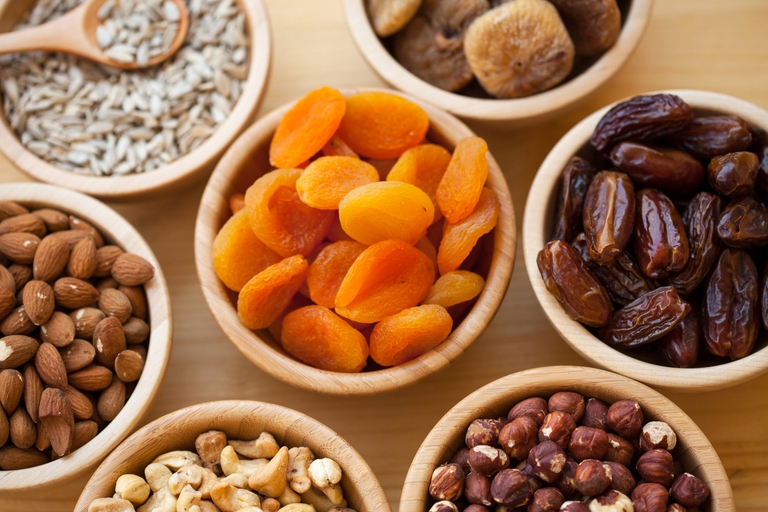https://www.lifegate.it/sali-minerali
- |
Mineral salts, what they are and what they are for
The main characteristic of minerals lies in their impossibility of being synthesized autonomously by living beings.Contrary to what happens for example with other vital substances (such as lipids, proteins, carbohydrates, etc.), for minerals you are obliged to look for them in vegetables, greens, fruit and legumes.
Actually the need for minerals is very minimal, but constant, and the body's task is to make up for the dispersion that occurs daily through sweat, urine and feces.Just think about minerals overall they represent only 6.2% of body weight but, despite the paltry sum, they suffer continuous deficiencies and imbalances in the modern diet.

There are a series of minerals that make up the human body and that we can find in the most commonly used foods.Below is a short list to present some of them and realize the fundamental role they play in our body.
Calcium performs a structural function
It is the most important mineral and the most present chemical element in the organism, contained in bones and teeth.It intervenes in blood coagulation, in the functioning of the heart and in neuro-muscular excitability.Deficiency symptoms manifest themselves in the form of muscle contractions, cramps, tetany, spasmophilia, insomnia, irritability, memory loss, bone fragility, cardiac arrhythmia, anxiety attacks.The assimilation of calcium depends on the right relationship with the phosphorus and by the presence of copper and silicon, as well as that of vitamin C;it is instead hindered by excessive consumption of white sugar, chocolate, antibiotics and pesticides.We can find it in the leafy green vegetables, sardines, dates, almonds, walnuts, milk, cabbage, seeds, shellfish, soybeans and dried beans.

Phosphorus gives energy and improves memory
It is the most abundant element after calcium and its absorption is linked to the presence of the latter and vitamin D.It plays an important function in arthritic pain and is a constituent part of the transmission of nervous impulses.It is essential to fix calcium in the bones.In the form of phospholipids it is one of the most important components of cell membranes, in the form of phosphate contributes to the bone mineralization process.The deficiency symptoms are physical and nervous fatigue, muscular atonia, anemia, increasing sensitivity to infections, rickets and arthritis, tooth decay and gingivitis.Those who abuse foods rich in phosphorus such as cola-based drinks and processed cheeses containing polyphosphates risk an imbalance in the calcium/phosphorus ratio to the detriment of calcium.Consuming white sugar could also alter the balance between these two important minerals.Cases of phosphorus deficiency are rare, given its easy availability in foods of both animal and plant origin.Good sources of phosphorus are: fish, brewer's yeast, egg yolk, nuts, legumes, dairy products and cheeses, chocolate, whole grains, seeds, vegetables and wheat germ.
Iron, one of the most important minerals for our body
It intervenes in the formation of hemoglobin and is fundamental both in the processes of cellular respiration and in metabolism, it is essential for the functioning of muscles and numerous enzymes.Participate in the collagen synthesis and to that of the neurotransmitters for serotonin, dopamine and norepinephrine, chemicals that regulate mood.It increases resistance to stress and disease, strengthens the immune system and promotes energy production.The iron contained in animal proteins is absorbed better than that of plant origin.If foods rich in vitamin C are also consumed together with foods rich in iron, absorption increases by 30 percent, while if acidic foods are cooked in cast iron the iron content can increase thirty times.Its best source is the liver.Deficiency symptoms can be found in tiredness, paleness, heart murmur, brittle nails, flaking or streaked longitudinally, fragile hair, hair and skin, angular stomatitis, menstrual disorders.It is naturally contained in the seaweed, red meat, green vegetables, raw molasses, egg yolk, beetroot, dried fruit, pork and veal liver, fish, poultry, horse meat, red wine, legumes and oilseeds.

Fluoride, for the well-being of bones and teeth
It is essential for teeth and the prevention of tooth decay.It also appears to promote the growth and calcification of the aorta.Deficiency symptoms are:dental caries and osteoporosis with bone fragility.The causes of deficiency are to be found in the poverty of fluoride consumed at the table which, however, can be integrated through the intake of whole grains, apricots, seaweed, sea fish, tea, sunflower seeds and spinach.
Iodine acts on the hormonal system
It is used for the formation of thyroid hormone, responsible for some metabolic processes.The main deficiency symptoms are hypothyroidism, enlarged goiter, weight gain, increased cholesterol, tiredness, delayed menstruation, bloating, loss of appetite, constipation, sensitivity to cold.It is contained in the marine products such as iodized salt.

Magnesium, a precious mineral for psycho-physical well-being
It intervenes in the metabolism of proteins and carbohydrates.In addition to presiding over the functions of the other minerals, fights physical and mental overfatigue putting stress under control.It is anti-tumor and plays a primary role in cardiovascular pathologies, including post-heart attack.The symptoms from magnesium deficiency, due to intensive agriculture which removes the mineral from the soil and to the refining and cooking of foods which lower its presence in food, are visible in muscular hyperexcitability, heart palpitations, anguish, digestive disorders, dizziness, asthenia, tremors, muscle contractions, premenstrual syndrome or dysmenorrhea.Women need magnesium more, especially during pregnancy, during breastfeeding or when using birth control pills.Children, the elderly and athletes also have particular needs.Magnesium is naturally contained in almonds, hazelnuts, walnuts, dried figs, dates, dried apricots and prunes, egg yolk and seafood, wheat germ, oat flakes, whole grains, honey, legumes, green vegetables, cocoa, bananas, crustaceans and molluscs.
Potassium, for the well-being of the heart and muscles
It is among the most abundant elements in the body.Regulates the presence of all other minerals within the cells.It influences muscle activity, especially that of the heart, and participates with sodium in the regulation of blood pH, muscle contractions, urine acidification, protein and carbohydrate metabolism.Potassium is necessary for synthesis of muscle proteins and proteins of amino acids in the blood.Deficiency symptoms are:intense fatigue, dizziness, constipation, muscle atonia, cardiac arrhythmia and cramps, insomnia, hair loss.We can take it through the consumption of lean meats, avocado, bananas, beans, brewer's yeast, dried apricots and figs, almonds, dried grapes, dates, walnuts, hazelnuts, sunflower seeds, vegetables, tomatoes, potatoes, molasses, soybeans.The richer your diet is in sodium, the more potassium you need to consume.

Selenium is anticancer
It prevents the onset of some types of cancer such as breast, esophagus, bladder, lung and cervical cancer. It delays aging and contributes to the proper functioning of the thyroid.It is easy to fall into a selenium deficiency because it is destroyed by cooking food and also because in many geographical areas it is the soil itself that is deficient.Its lack causes rheumatism, arthrosis, ringing in the ears, oily skin, stretch marks and blemishes on the skin.It is sufficient to take minimal quantities, since at higher doses it can be toxic and it is possible to integrate it into the daily diet through whole organic cereals, sesame grains, corn, onion, tomatoes, barley, oats, rye, spelt, tuna, herring, salmon, anchovies, wheat germ and bran.
Zinc controls insulin levels in the blood
It participates in the formation of various enzymes and the metabolism of vitamin A and is important for wound healing.It is necessary for the growth and renewal of the organism.Keeps cells young, protects against diseases.It is easy to be deficient, especially if you have a habit of eating refined grains and drinking alcohol.Symptoms of deficiency include a delay in growth and especially sexual development, headaches, skin changes, joint pain, brittle nails and hair loss.Males lose zinc in their semen.It is found in the oysters, herring, mushrooms, brewer's yeast, wheat germ, oats and corn, meat in general, nuts, pumpkin seeds, seafood, soy, eggs, beans.
Copper, an excellent antioxidant
It participates in the formation of red blood cells, intervenes in the formation of hemoglobin, has anti-infective and anti-inflammatory properties and is an ally in the well-being of bones and hair.Ha antioxidant function, prevents cardiovascular diseases and is considered an anticancer. Liver, shellfish, legumes, fish, spinach, seaweed, walnuts and hazelnuts, cabbage, oats, are sources of copper.
Summary table of mineral salts
| Mineral | Main function | Deficiency symptoms | Food sources |
|---|---|---|---|
| Soccer | Health of bones and teeth, blood clotting | Cramps, bone fragility | Green leafy vegetables, dairy products |
| Phosphorus | Energy, bone health | Muscle atonia, anemia | Fish, legumes, nuts |
| Iron | Hemoglobin formation, oxygen transport | Tiredness, paleness | Red meats, legumes |
| Magnesium | Protein metabolism, muscle function | Cramps, irritability | Nuts, seeds, whole grains |
| Potassium | Nerve and muscle function | Cramps, tiredness | Bananas, avocado, potatoes |
| Fluorine | Health of bones and teeth | Dental caries, osteoporosis | Complete cereals, sea fish, tea |
| Iodine | Formation of thyroid hormones | Hypothyroidism, goiter | Marine products, iodized salt |
| Selenium | Cancer prevention, thyroid function | Rheumatism, skin problems | Whole grains, fish, eggs |
| Zinc | Vitamin A metabolism, wound healing | Growth retardation, skin problems | Oysters, meat, legumes |
| Copper | Formation of red blood cells, antioxidant properties | Anemia, bone and hair problems | Liver, legumes, nuts, seeds |
In this study, we have explored the world of mineral salts, inorganic elements essential for countless functions of our organism.Despite their minimal presence in the body, their impact is enormous, influencing the health of bones, muscles, and even our mental activity.Our daily diet, rich in vegetables, fruit, and other natural foods, is the key to ensuring an adequate supply of these precious nutrients, essential for keeping our body in good health and full of energy.
FAQs mineral salts
What are mineral salts?
Mineral salts are inorganic substances essential for our body.They cannot be synthesized independently and must be ingested through food.They represent a vital part of bodily functions, contributing to the health of bones, teeth, and metabolic processes.
What are mineral salts for?
Mineral salts are fundamental for numerous biological processes.They help build bones and teeth, participate in blood clotting, support muscle and nerve function, and are crucial for cellular metabolism.
Where are mineral salts found?
They are found in a variety of foods.Major sources include green leafy vegetables, fruits, legumes, nuts, seeds, meat, fish and dairy products.Their presence varies depending on the type of food and its origin.
What are the most important mineral salts?
Among the most important are calcium, for bones and teeth;phosphorus, which supports bone health and cellular energy;iron, essential for the transport of oxygen in the blood;magnesium, for energy metabolism;and potassium, for muscle and nervous function.
